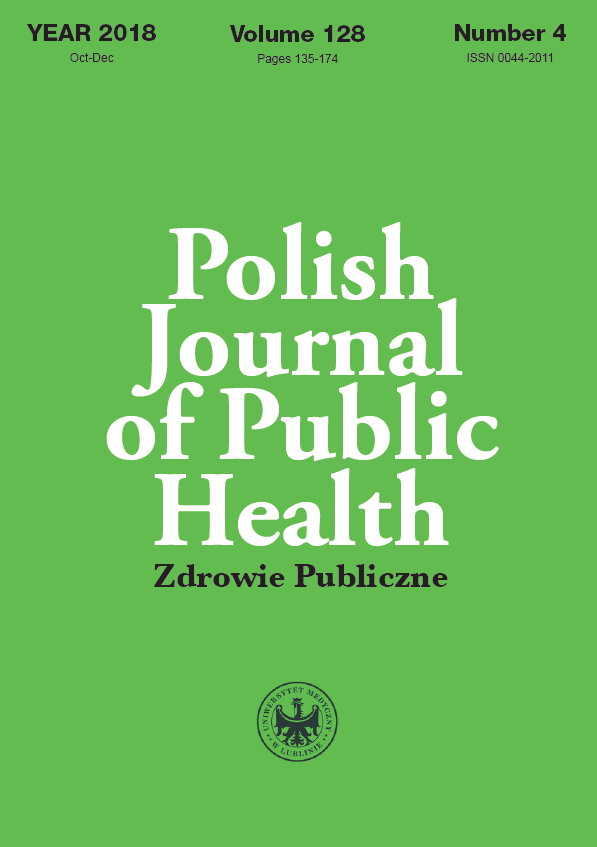Benefits of Motivational lnterviewing application for patients and Healthcare professionals
DOI:
https://doi.org/10.2478/pjph-2018-0034Keywords:
Motivational Interviewing , training, effectiveness, coimnunication, healthcare providers, self-efficacy, self-confidenceAbstract
Motivational Interviewing (MI) is a collaborative, goal-oriented and focused on change, style of communication. It is characterised by the MI provider’s empathy, understanding, mental and emotional attitudes towards the patient. This non-judgemental conversation is aimed at strengthening inner motivation and commitment to attain the goal and is based solely on the individual’s reasons for change. The initial application of MI in clinical psychology has been modified appropriately to allow for its use in health care, rehabilitation, public health, social work, dentistry, social rehabilitation, coaching and education. It is recommended for introducing new behaviours, lifestyles and therapeutic adherence. The application of MI contributes to the enhancement of patient-healthcare worker communication, the patient’s concordance and compliance. On the other hand, learning and adopting this method in counselling is useful for healthcare professionals. In treatment, greater patient awareness and obedience lead to more conscientious responsibility for treatment and health, which in turn, produces better therapy outcomes that serve as confirmation of the merit of the therapy prescribed. The application of MI contributes to health professionals’ greater success, satisfaction, self-confidence and a sense of self-efficacy.
The aim of this work is to present the essential features of MI as well as some interesting examples of research showing the benefits of using MI and ideas for training it. Non-systematic literature review of the years 2005-2018 on the use of MI in health promotion in PubMed provided evidence of wide use of MI by healthcare professionals
References
1. Miller WR, Rollnick S. Dialog motywujący. Jak pomóc ludziom w zmianie. Kraków: Wydawnictwo Uniwersytetu Jagiellońskiego; 2014.
2. Miller WR, Rollnick S. Motivational interviewing: Preparing people to change addictive behavior. New York: Guilford Press; 1991.
3. Rollnick S. Miller W. Butler C. Wywiad motywujący w opiece zdrowotnej. Warszawa: Wydawnictwo Szkoły Wyższej Psychologii Społecznej “Academica”; 2010.
4. Miller WR, Moyers TB. Motivational interviewing and the clinical science of Carl Rogers. J Consult Clin Psychol. 2017;85(8):757-66. doi. org/10.1037/ccp0000179.
5. Jaraczewska JM, Adamczyk-Zientara M. Dialog motywujący. Praca z osobami uzależnionymi behawioralnie. Warszawa: Ministerstwo Zdrowia Warsaw Eneteia; 2015.
6. Mrozowska O. Przenzak A. Dialog motywujący – budowanie mostu do zmiany. Cz. 1. Terapia uzależnienia i współuzależnienia. 2013;(2):15-6.
7. Mrozowska O. Przenzak A. Dialog motywujący – budowanie mostu do zmiany. Cz. 2. Terapia uzależnienia i współuzależnienia. 2013;(3):19-23.
8. Schoo AM, Lawn S, Rudnik E, Litt JC. Teaching health science students foundation motivational interviewing skills: use of motivational interviewing treatment integrity and self-reflection to approach transformative learning. BMC Med Edu. 2015;15:228. doi.org/10.1186/s12909-015-0512-1.
9. Winnicki M, Basiński K, Szydler A, et al. How to improve adherence and quality of patient-physician cooperation. Choroby Serca i Naczyń. 2016;13(3);194-202.
10. Miller SJ, Foran-Tuller K, Ledergerber J, Jandorf L. Motivational interviewing to improve health screening uptake: A systematic review. Patient Educ Couns. 2017;100(2);190-8. doi.org/10.1016/j.pec.2016.08.027.
11. Lundahl B, Moleni T, Burke BL, et al. MI in medical care settings: A systematic review and meta-analysis of randomized controlled trias. Patient Educ Couns. 2013;93:157-68.
12. VanBuskirk KA, Wetherell JL. MI with primary care populations: a systemic review and meta-analysis. J Behav Med. 2014;37:768-80.
13. Rubak S, Sandbaek A, LauritzenT, Christensen B. Motivational interviewing: a systemic review and meta-analysis. BJGP. 2005;55(513):305-12.
14. Wright TE, Terplan M, Ondersma SJ, et al. The role of screening, brief intervention, and referral to treatment in the perinatal period. AJOG. 2016;215(5):539-47.
15. [http://easo.org/wp-content/uploads/2015/10/patientcouncil-a4_v1.pdf.] Access: 26.09.2018.
16. McKee J. Motivational interviewing: learning a new skill, Pharmacy Times. 2013;April. [https://www.pharmacytimes.com/publications/directions-in-pharmacy/2013/april2013/motivational-interviewing-learning-anew-skill.]
17. Lindhardt CL, Rubak S, Mogensen O, et al. Healthcare professionals experience with motivational interviewing in their encounter with obese pregnant women. Midwifery. 2015;31(7);678-84. doi.org/10.1016/j.midw.2015.03.010
18. Stoffers PJ, Hatler C. Increasing nurse confidence in patient teaching using motivational interviewing. J NPD. 2017. doi: 10.1097/NND.0000000000000370.
19. Chisholm A, Nelson PA, Pearce CJ, et al. Motivational interviewing – based training enhances clinicians’ skills and knowledge in psoriasis: findings from the Pso Well® study. BJD. 2017;176(3);677-86. doi. org/10.1111/bjd.14837.
20. Windt J, Windt A, Davis J, et al. Can a 3-hour educational workshop and the provision of practical tools encourage family physicians to prescribe physical activity as medicine? A pre-post study. BMJ Open. 2015;5(7). doi:10.1136/bmjopen-2015-00792.
21. Rouleau CR, King-Shier KM, Tomfohr-Madsen LM, et al. The evaluation of a brief motivational intervention to promote intention to participate in cardiac rehabilitation: A randomized controlled trial. Patient Edu Couns. 2018;101(11);1914-23. doi.org/10.1016/j.pec.2018.06.015.
22. Nightingale B, Gopalan P, Azzam P, et al. Teaching brief motivational interventions for diabetes to family medicine residents. Fam Med. 2016;48(3);187-93.
23. Östlund AS, Kristofferzon ML, Häggström E, Wadensten B. Primary care nurses’ performance in motivational interviewing: a quantitative descriptive study. BMC Family Practice. 2015;16:89. doi.org/10.1186/s12875-015-0304-z.
Downloads
Published
Issue
Section
License
Copyright (c) 2019 Polish Journal of Public Health

This work is licensed under a Creative Commons Attribution-NonCommercial-NoDerivatives 3.0 Unported License.


